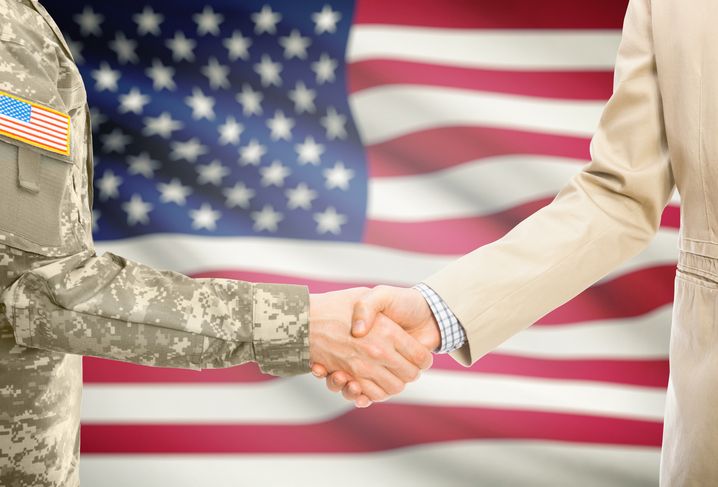Editor’s Note: the Patriots in Business Award presented annually by Chief Executive and Thayer Leadership recognizes outstanding businesses that lead our nation in supporting active duty military members, veterans and their families and exemplify the values of Duty, Honor and Country through their business practices and throughout their community and industry. Through their initiatives on hiring, training, supporting, and honoring Active Duty, Veterans and military families, these outstanding companies are the gold standard for other companies who seek to support those who serve. This year’s winners will be honored with a ceremony at the Nasdaq Marketsite in New York on Veteran’s Day, Nov. 11.
At a time when talent is hard to come by, veteran and active-duty initiatives enable companies to support America’s military families in a meaningful way while also gaining access to a pool of highly skilled workers, many with leadership experience. It’s a double win that GuidePoint Security and Johnson & Johnson—winners of the Patriots in Business Award presented annually by Chief Executive and Thayer Leadership—are quick to acknowledge.
“Almost 20 percent of our organization consists of veterans, many of whom received some relevant training in cybersecurity or intelligence while serving our country,” says Michael Volk, founder and managing director of GuidePoint Security. “The military provides a great environment to recruit cybersecurity talent. Additionally, we are in a position to not only benefit from this talent, but also to provide good opportunities to those who served when they transition out of the military—it’s a win-win.”
Johnson & Johnson CEO Joaquin Duato, echoed the sentiment, noting that hiring veterans fits with the company’s purpose-driven and values-based culture. “At Johnson & Johnson, we are grounded in ‘Our Credo,’ which means putting the needs and well-being of the people we serve first,” he says. “Living these values means that we have a responsibility to our employees, many of whom are veterans or service members. These individuals are valued members of our communities, and their military experience contributes to our business success.”
We asked this year’s winners to share their biggest lessons and advice on how companies can work well with active-duty military members, veterans and their families. Here’s what they had to say.
‘Incorporate the Unique Strengths’
Joaquin Duato, CEO, Johnson & Johnson
Supporting veterans means supporting the entire military-connected community, including their spouses, children and caregivers. We incorporate the unique strengths and needs of this community through Company-wide programs that are part of the everyday function of our business.
Engage with the military-connected community as part of your organization’s overall approach to your business. For instance, we proudly partner with many veteran-owned suppliers. We have also incorporated this community into our overall recruiting and talent management strategy.
Remember: this community brings unique strengths as leaders and bridge builders, two skills that are valuable in the boardroom and the battlefield.
‘Be Real Clear’
Michael Volk, Founder and Managing Director, GuidePoint Security
Hiring cybersecurity talent is hard… just look at all the statistics on the cybersecurity skills shortage. Organizations need to be more creative in their hiring processes. We have developed GuidePoint Security University to specifically address this challenge—working with those transitioning out of the military to chart a career path across a range of cybersecurity disciplines based on their training and interest. Certain non-cyber skills can translate well into a cyber career with the right focus and training and so we have learned to take alternate routes to bringing in good talent to grow and ultimately help support our customers.
Understand each branch’s transition programs as they can be very helpful—oftentimes helping to defer some onboarding/training costs. I think it’s important to be real clear on what skill sets and experience you are looking for—and relay this information to the transition groups with whom you are working. Understand that veterans will require some coaching on how things are done in the “civilian world,” but they almost always have finely honed technical skills, developed over their careers. Plus, the discipline, drive and leadership qualities the military embeds in almost all veterans is really helpful in the civilian world.
























































![Key Metrics for Social Media Marketing [Infographic] Key Metrics for Social Media Marketing [Infographic]](https://www.socialmediatoday.com/imgproxy/nP1lliSbrTbUmhFV6RdAz9qJZFvsstq3IG6orLUMMls/g:ce/rs:fit:770:435/bG9jYWw6Ly8vZGl2ZWltYWdlL3NvY2lhbF9tZWRpYV9yb2lfaW5vZ3JhcGhpYzIucG5n.webp)






![‘Stay the Night’ Sees Two Strangers Tackling Tough Times Together [Exclusive] ‘Stay the Night’ Sees Two Strangers Tackling Tough Times Together [Exclusive]](https://static1.colliderimages.com/wordpress/wp-content/uploads/2022/09/stay-the-night.jpg)











